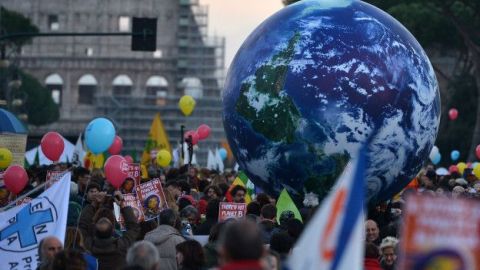Editorial: The Climate Change Summit
In Paris it is urgent to halt a global rise in temperature to prevent disastrous consequences.

Crédito: Getty
The United Nations’ Conference on Climate Change, or COP21, starting today in Paris aims to reach a global commitment to control the emission of greenhouse gases in order to prevent a future catastrophe triggered by a 2-degrees-Celsius rise in temperature.
Representatives of 190 countries will meet for two weeks to study the situation, and 170 of them will present their plans to avoid this type of pollution, which threatens the future of Humanity. It is estimated that, if the world’s economies continue exploiting carbon-based resources and the emission of carbon dioxide increases, average global temperatures will go up at least 4 degrees Celsius by the year 2100. Sea levels will also rise about a meter, causing terrible effects on the poorest communities.
More than 20 years have passed since the first large international meeting on the issue. Since then, weather catastrophes have only multiplied. It is estimated that the average 335 disasters per year reported around the world have doubled in the last 10 years compared to the 1985-95 period.
President Obama is one of the major enthusiasts backing the proposal to reduce polluting gases. The topic has been among the top issues in his agenda when he has met with other world leaders. One of his objectives is to convince the world that the U.S. is able to meet the goals to reduce gases it has established through executive actions.
The problem is not Obama’s lack of credibility, but that of a Republican Congress who – despite the overwhelming evidence – continues to question the science behind the effects of human activity in climate change, and considers that reducing gases will harm the economy. Seeking to weaken his leverage, opposition legislators have said that they will not ratify any “treaty” signed by Obama.
It is sad to see that our country is incapable of forming a common front against a global threat of this type. Such is the nature of politics. Still, this should not deter the nations participating in the conference from establishing a commitment to protect future generations from the dangers we are creating today.




